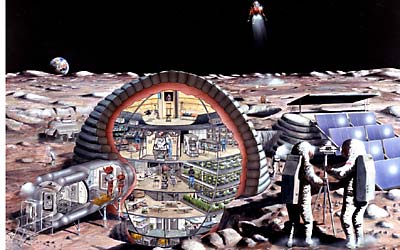Inserting the “s” word: a modest proposalby Derek Webber
|
| We need the space policy of the United States to contain an explicit statement that one of its purposes is to make possible the eventual settlement of humans elsewhere in the solar system. |
Why do I want this? Because, if this is recognized publicly as a very long term aim, then everything else in the space program makes sense. Von Braun, Tsiolkovsky, Hawking and many others have underlined for us why in the long term this will become necessary (solar life cycle, asteroid bombardment, gamma-ray bursts, and so on.) This is the ultimate existential reason behind humanity’s progress in the last century from the beginnings of aviation to the Moon landings. We are in a position, because of the risks taken on our behalf by the early space explorers, to be able to make such a future possible for mankind. Because it is such a very long term aim, there is no need at this stage to even have budget implications.
If there are no immediate budget implications, then why does it matter to have this explicit statement included in our space policy? What difference would it make? And if there are no immediate budget implications, why might there be any resistance to making the overt existential statement? Many readers are aware of the superb contribution made by John Marburger, who was President George W Bush’s director of the Office of Science and Technology Policy. He went on public record in 2006 saying we should “prepare now for a future in which the material trapped in the Sun’s vicinity is available for incorporation into our way of life.” (See “A Moon full of opportunity”, The Space Review, January 22, 2007)
President Obama himself said in 2010 that “our goal is the capacity for people to work…and live safely beyond Earth for extended periods of time, ultimately in ways that are more sustainable and even indefinite.” Jeff Greason declared in 2011, “It is actually the national policy of the United States that we should settle space, but everyone’s kind of afraid to say so.” (See “New strategies for exploration and settlement”, The Space Review, June 6, 2011)
| We must be honest about these very long term timescales. Taxpayers need to know this is for their grandchildren and descendants. |
I think it’s time to put behind us any such “fears” and embrace our responsibilities. This kind of very long term aim is not inherently Republican or Democrat. Even religious leaders could get behind the idea that we have a responsibility, ultimately, to provide an Ark to ensure that plant and animal life survives any approaching catastrophe. I believe the difference will be significant following the introduction of the “s-word” into our space policy. Space attorneys will have a new incentive to sort out ownership issues about space resources. There would be new clarity about the R&D priorities, and why such areas as in situ resource utilization (ISRU), fuel depots, and a new “gateway” station near the rim of Earth’s gravity well, require support. The essentially international nature of space exploration will become apparent. Space policy would become more connected with the main challenges that we are trying to solve here and now on Earth: jobs, clean energy reserves, economic stagnation, strategic resource limitations, stewardship of the Earth’s environment, and more.
But we must be honest about these very long term timescales. Taxpayers need to know this is for their grandchildren and descendants. Even though Elon Musk is planning for Mars settlement within his own lifetime, there is no reason for an accelerated schedule following adoption of the s-word into the raison d’être of the national space policy. It only matters that we are headed in the right direction. That is why this is such a modest suggestion. Once accepted into the rubric of space policy, then there will be an inexorable movement towards achieving the ultimate objective, and then we shall have paid an appropriate tribute to those (from both the US and Russia) who gave their lives to give us this opportunity. Surely this is not asking too much?
